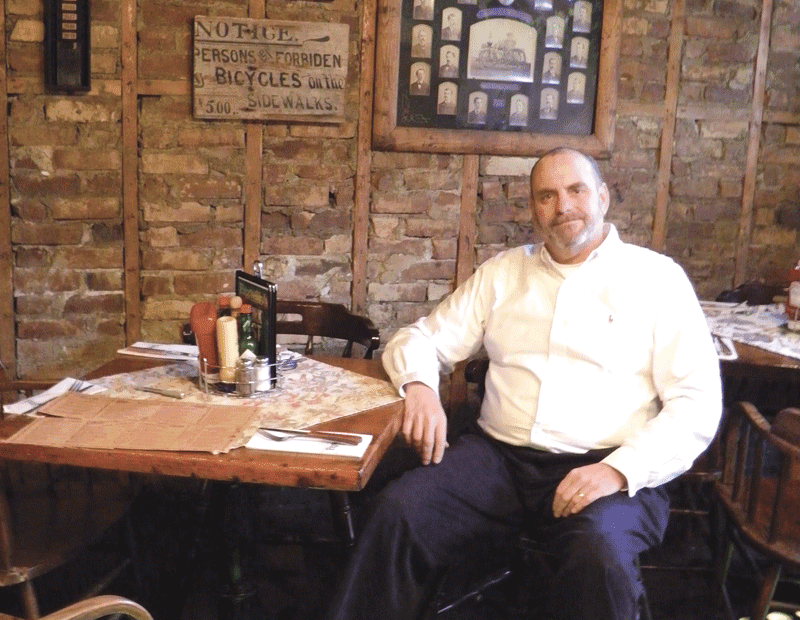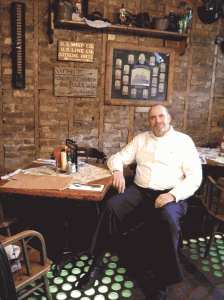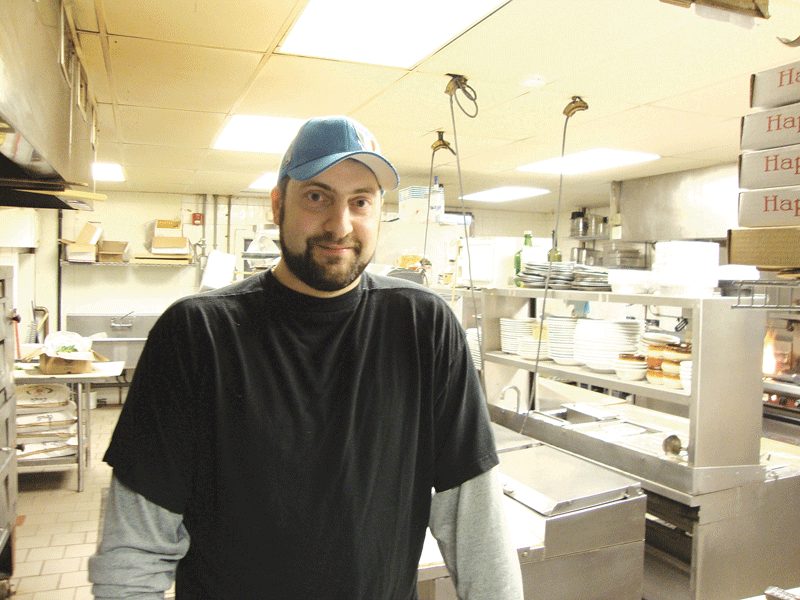Restaurant Owners Hope to Emerge from Recession Stronger
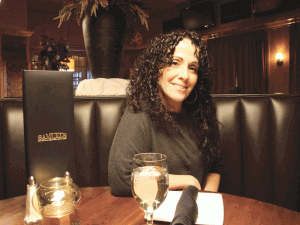
Gina Campiti says the economics of the restaurant industry may have changed, but its focus on customers should not.
Area restaurants report increased numbers of people dining out. But is this a sign that the industry is out of the weeds? Numerous restaurant closures have been on the front pages for the past year, but most owners and managers say that, if a business has come this far, the year ahead promises to put a little more on their plates.
Reflecting on the three high-profile restaurants that have closed within a scone’s throw of her restaurant in the last year — Sitar, Onyx, and Pazzo — Gina Campiti said, “it was scary. It is scary.”
Campiti is the general manager of Samuel’s Sports Bar at the Basketball Hall of Fame, and for her, such closures aren’t good for her business and the spirit of healthy competition — but, most importantly, they’re not good for the city of Springfield.
“I feel terrible for those people that went out of business,” she said. “That’s an incredible loss of money for the owners, a loss for the staff, and a loss for those people who enjoyed the restaurants. It’s depressing in such high-profile parts of the city.”
But the space formerly housing Onyx isn’t dark anymore. The Spoleto Group, owner of seven area restaurants, including their namesake Italian dining room in Northampton, unveiled their latest “concept,” as Bill Collins calls them, this past summer. And with three bars and 450 seats, this second Mama Iguana’s location is anything but quiet.
Collins is the chief operating officer of the Spoleto Group, and he and owner Claudio Guerra both say this location has been one of the most exciting for the pair. “It’s our busiest location out of all our restaurants,” Collins said.
“The reason why is that, if you take a look at what has closed there,” he said, “places were selling food at $25 to $28 a plate, with $12, $15 martinis. And here we are, selling a quality house margarita for $7.50. We’re selling entrees for $9 to $12. Our focus is keep it cheap, keep it fun, and they will come. We’ve had great success with people reacting to our prices in this downturn.”

Bill Collins (right, with Claudio Guerra) says patrons respond to reasonable prices and a fun atmosphere.
Springfield isn’t alone in high-profile closures along all price points in the restaurant industry. As it navigates Chapter 11 bankruptcy, Friendly’s closed four regional branch locations in January, with another 37 shutting their doors across the country — all this in addition to 63 locations that closed nationwide in October. And Northampton has one fewer fine-dining choice, as the longtime haunt Green Street Café is set to close at the end of January.
At the same time, the nation’s restaurateurs are claiming a rebound in 2011 after two lean years. The National Restaurant Assoc. reports that restaurants added a net 230,000 jobs during 2011, their strongest performance since 2006. In addition, the restaurant industry finished the year only 20,000 jobs shy of fully adding back the 366,000 jobs lost during the recession. Complete recovery is expected in early 2012.
In talking to area restaurateurs, their news was more like fine wine than sour grapes, and in addition to some strong sales numbers, most offered that the gradual crawl out of the economic downturn has given them hope for the year ahead. If they made it this far, they said, 2012 holds the promise of a rebounding marketplace along with the business acumen honed from staying afloat through the Great Recession.
So, what’s on the menu for 2012? BusinessWest sat down with chefs and operators of area restaurants and gathered some food for thought.
Dish Network
Campiti unfolded the leatherbound menu on the table in front of her, which now offers 51 tapas dishes to choose from.
“This menu is a big change for us,” she explained, “and I think it’s headed in the right direction. We were successful with half the number of tapas that we had on there before. I’m hoping for even half of the excitement that we had after we changed our menu the last time.”
She explained that the little dishes are a different concept in dining, and the past year’s successful operations at Samuel’s are a direct result of that.
“Some would say, if you give people too much choice, they’ll never make up their mind,” she explained. “But you don’t need to make up your mind! A tapa is a small plate. Instead of concentrating on one entrée in front of you, you’ve got a bunch of different plates on your table that you pick from. You talk, you share. You put a big entrée in front of someone, and that’s the center of their attention. Put a variety of plates around the table, and it promotes conversation.”
Her restaurant’s location in the Hall of Fame building is a slam dunk, she said, even with the number of other eateries in close proximity.
“People go where people are,” she continued. “If it’s a busy area, people will come out. It’s an attraction. It’s not competitive to us. It can actually complement the businesses around it. Everyone has their own brand, and customers want variety.”
Ralph Santaniello, co-owner of the Federal in Agawam, agreed with that sentiment. “I’m of the belief that there aren’t just a set number of restaurants that can survive. If you do a good job, there’s room for everyone.
“At the end of the day,” he went on, “the more diners that we can keep in the Springfield area, that’s a good thing for all of the restaurants around us — not to lose them to Northampton or West Hartford.”
He and Mike Presnal, his business partner and head chef, said that 2011 was a strong year. “Not only were we up around 20% over the year before, saleswise,” Santaniello said, “but our gift-certificate sales were up even higher. In December, that was around 35%.”
Asked for the secret ingredient to their success, Santaniello said it was simple: consistency and quality.
“Number one, we have never had a different chef,” he said. “And the fact is, we’re a chef-owned restaurant, a chef-driven restaurant. It’s hard to make it when you’re an owner but not an operator. We know what goes in and out of the kitchen and bar and dining room every night of operation.”
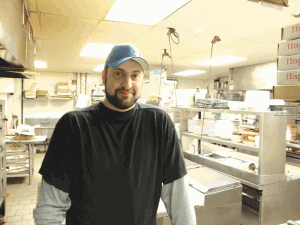
Antonio DiBenedetto says consistency is one key to keeping diners returning to a restaurant often.
Antonio DiBenedetto said that consistency is not only a key aspect of success in running a restaurant, but one of the main reasons for a house’s success. He’s been the owner of Amedeo’s Restaurant in Holyoke for 11 years, but the business has been in the family for almost 30 years.
“It can be tough out there,” he noted, “but I think that places are closing down because there’s a lack of complete attention. You have to keep an eye on everything going on around you, every aspect of the business, not just food. It’s not one thing, it’s a million things, and consistency is a big one. The same person has made the sauces here for years. There’s no book for recipes; our food has been the same for decades.”
He joked that no one makes meatballs like his mother — “but every Italian cook will tell you that!” — and that his restaurant has weekly specials to offer some variety beyond what people might find locally. “Whatever looks good, or whatever’s in season,” he said — “osso buco, veal chops. One of my favorites is chicken carbonara, since I was a kid and my mom would make it. I try to duplicate it, but of course it’s not as good as hers.”
New World Order
The Farm Table restaurant is the newest business venture from the Kittredge family, owners of Kringle Candle. It’s housed in one of the oldest structures in Bernardston, across from the candle company’s retail flagship, and after a meticulous renovation both historic and green, it opened for lunch and dinner this past October.
Rubén Eduardo is the general manager of the restaurant, and he said that opening a restaurant in what many acknowledge to be a still-sluggish economy offered nothing but uncertainty. “We all know that the national economy was in a pretty low gear,” he added, “so we had no clear idea what would be the response when we opened.”
But what followed exceeded even their highest expectations. “I thought that we would hit about 30 reservations during the nighttime and about the same at lunch, and to my surprise, especially in this economy, it has been quite the opposite direction. Day one, for example, when we were open for lunch, we were expecting 30 or 40 people to join us. We had more than 200. So then we said, ‘OK, maybe that’s more like friends and family.’ But that trend didn’t go down.”
Early on, he realized that his reservation operation needed to be re-evaluated. With one person acting as host and fielding calls for reservations, it wasn’t enough for peak performance, especially for a day with reservations into the triple digits: one Tuesday alone fielded 400 calls for dinner.
Currently more than 60% of his clientele are repeat diners, and some of them are traveling from as far as Connecticut. He said people respond to the restaurant’s mission. “Western Mass. is blessed with amazing products and craftsmanship. In terms of our philosophy, the idea is that the food is, whenever possible, organic and sustainable. And priority is given to local farms. That is reflected in the building as well.”
The ceilings and floors are made from salvaged barn boards, all the stone work comes from within a 50-mile radius, and most of the furniture is made in Vermont. “Even our napkins are made in Hadley,” Eduardo added.
These are the details that make a difference, he said, for the customers and the staff — whom he credits for contributing to a memorable experience. “When our team is serving, they’re proud that these foods are local,” he continued. “These are the things that make a difference in the culture of a restaurant. I think that the enthusiasm from the public comes from the enthusiasm of a restaurant’s team.”
At the new Mama Iguana’s, Collins said a similar level of attention to each restaurant’s physical space has always been a key ingredient to the Spoleto Group’s success. “But the tough part about the economy now is that Claudio and I have had to change how we run the businesses,” he said. “It used to be easy to put up a great atmosphere with great food and service, and you’ve got yourself a busy restaurant that’s making money. It’s now more of a scientific business for us.”
The seven restaurants they oversee are Spoleto’s in Northampton and East Longmeadow; Spoleto Express, Pizzeria Paradiso, Paradise City Tavern, and Mama Iguana’s, all in Northampton; and the newest Mama Iguana’s in Springfield. Collins said this new economy has turned the pair into better businesspeople than they were before.
“We’ve been forced by the times and the economy to do that, and what Claudio and I are finding is that it’s the most exciting thing we’ve ever done,” he said. “We have taken an approach during this downturn to make all our concepts as affordable as possible. We’d rather set a stage where guests could come out two, three times a week and have an affordable, great meal, rather than having them come in once for $150 and not see them again for a couple weeks. Because what do people need at this time more than ever? A release — a place to come for a cocktail and some good food.”
After an entire life spent in the restaurant industry, Guerro agreed, adding that “this is a new world we’re living in. A couple years ago, we were asking, ‘how do we survive this storm?’ Now, it’s more like this is the new reality, and how do we make money in that reality?”
“We’ve been working a tremendous amount on the nuts and bolts of our operation, and streamlining the systems,” Collins said. “With these transitions, when the economy comes back, we’re ready for takeoff.”
Your Serve
Over at Samuel’s, Campiti agreed that the industry she has worked in all her life has been altered. “To me, I don’t look at this as a recession any longer,” she explained. “Now, it’s a change in the way of life.”
But, there’s one thing that doesn’t change, she said — a focus on customers, an idea which everyone who spoke with BusinessWest agreed.
“A customer walks through your door prepared to have a good experience, and they are pleasantly surprised to have a great experience,” Campiti said. “That’s what keeps us all here.”





